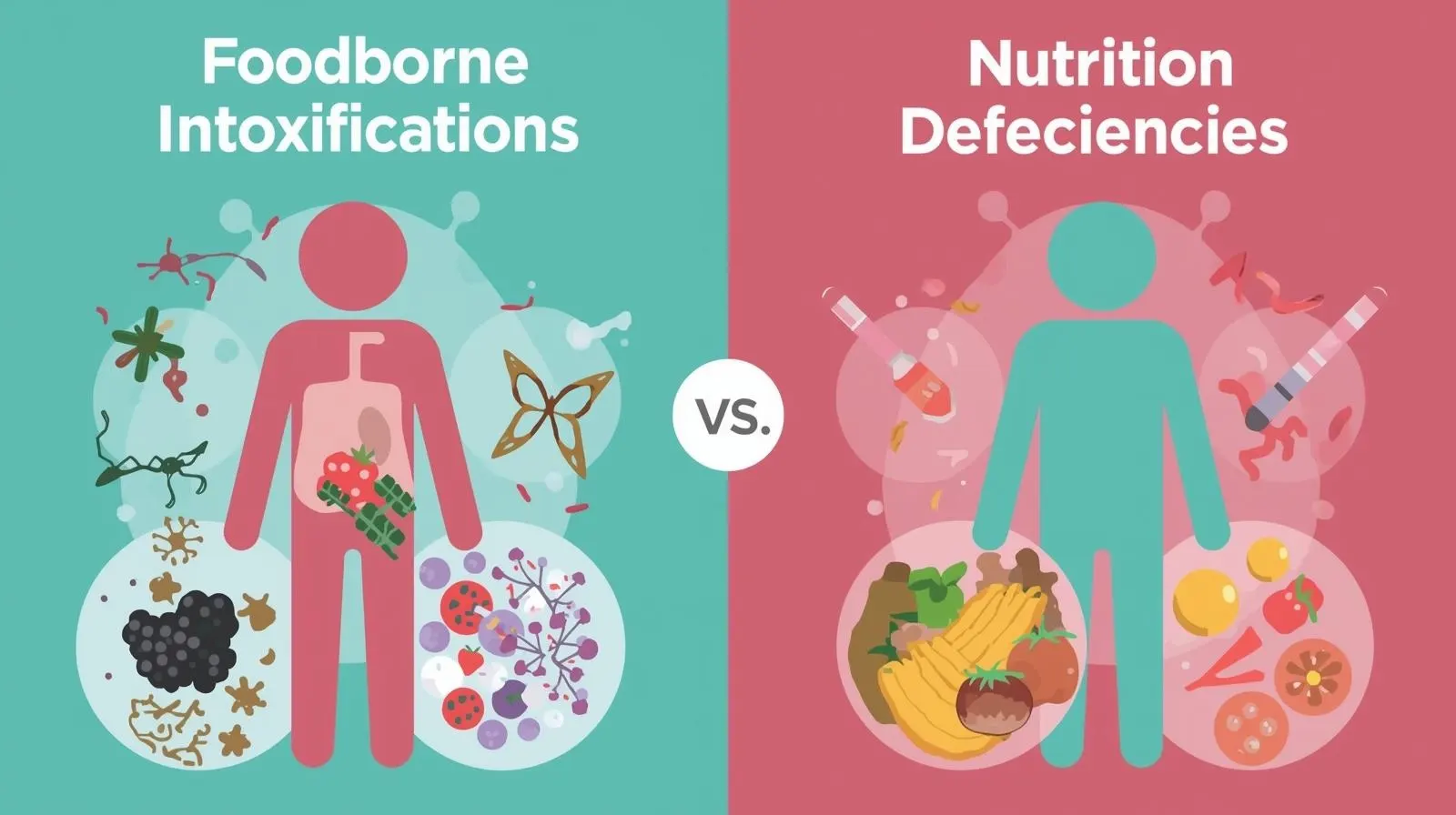Food infections and nutrient deficiencies are distinct health issues related to nutrition, but they involve different mechanisms and have different consequences. Let’s explore each concept:
Food Infections:
Definition: Food infections occur when harmful microorganisms, such as bacteria, viruses, parasites, or fungi, are ingested through contaminated food or water.
Cause: Contamination can happen at any stage of the food production process, from farm to table. Common sources include undercooked or raw meat, contaminated water, unpasteurized dairy products, and unwashed fruits and vegetables.
Symptoms: Food infections can lead to symptoms such as diarrhea, nausea, vomiting, abdominal pain, fever, and in severe cases, dehydration. The onset of symptoms is usually relatively quick after consuming the contaminated food.
Prevention: Proper food handling, cooking, and storage, along with good personal hygiene and sanitation practices, are essential to prevent food infections.
Nutrient Deficiencies:
Definition: Nutrient deficiencies occur when the body does not receive an adequate amount of essential nutrients, including vitamins, minerals, proteins, and fats.
Cause: Insufficient intake of certain nutrients, poor absorption, increased nutrient requirements (e.g., during pregnancy), or medical conditions that interfere with nutrient utilization can lead to deficiencies.
Symptoms: The symptoms of nutrient deficiencies vary depending on the specific nutrient lacking. Common symptoms include fatigue, weakness, impaired immune function, poor growth and development (in children), and a range of specific symptoms related to the deficient nutrient.
Prevention: A balanced and varied diet that includes a wide range of foods from different food groups is crucial for preventing nutrient deficiencies. In some cases, dietary supplements may be recommended, especially for individuals at risk of specific deficiencies.
In summary, food infections are caused by the ingestion of harmful microorganisms through contaminated food or water, resulting in acute illness. Nutrient deficiencies, on the other hand, stem from an inadequate intake or absorption of essential nutrients over time, leading to a variety of health issues. Both issues highlight the importance of maintaining proper food safety and nutrition practices for overall health and well-being.
Signs of Food infection ?
The signs of a food infection, also known as foodborne illness or food poisoning, can vary depending on the specific microorganism involved and the severity of the contamination. However, common signs and symptoms of food infections include:
Gastrointestinal Symptoms:
Diarrhea: Often watery or bloody stools.
Nausea: A feeling of discomfort in the stomach with an urge to vomit.
Vomiting: Forceful expulsion of stomach contents.
Abdominal Pain: Cramping or discomfort in the stomach or abdominal region.
Systemic Symptoms:
Fever: An elevated body temperature is common in many foodborne infections.
Fatigue: Feeling tired or lethargic.
Muscle Aches: Discomfort or pain in the muscles.
Other Symptoms:
Headache: A common symptom in some foodborne illnesses.
Dehydration: This can result from severe diarrhea and vomiting and may lead to additional symptoms such as dry mouth, dark urine, and dizziness.
Onset Time:
Symptoms typically begin a few hours to a few days after consuming the contaminated food. The onset may vary depending on the specific pathogen involved.
Duration:
The duration of symptoms can vary. In many cases, symptoms are acute and resolve within a few days without medical intervention. However, some infections can be more severe and may require medical attention.
It’s important to note that if someone experiences severe symptoms, such as persistent vomiting, high fever, signs of dehydration, or symptoms that worsen over time, they should seek medical attention promptly.
The types of microorganisms that can cause food infections include bacteria (e.g., Salmonella, E. coli), viruses (e.g., Norovirus), parasites (e.g., Giardia), and fungi (e.g., molds producing mycotoxins). The specific symptoms and severity can vary based on the type of microorganism and the individual’s health status. If you suspect a foodborne illness, it’s crucial to stay hydrated and seek medical advice if needed.
Signs of nutrient deficiencies?
Nutrient deficiencies can manifest in various ways, and the signs and symptoms often depend on the specific nutrient that is lacking. Here are some common signs of nutrient deficiencies for key vitamins and minerals:
Iron Deficiency:
Fatigue: Feeling unusually tired or weak.
Pale Skin: A paleness of the skin, especially noticeable in the face and inner lining of the lower eyelids.
Shortness of Breath: Difficulty breathing or feeling breathless.
Vitamin D Deficiency:
Bone Pain: Pain or aching in the bones, especially the back and legs.
Muscle Weakness: Reduced muscle strength and function.
Increased Susceptibility to Infections: Vitamin D plays a role in immune function.
Vitamin B12 Deficiency:
Fatigue and Weakness: Similar to iron deficiency, B12 deficiency can lead to fatigue and weakness.
Neurological Symptoms: Tingling or numbness in the hands and feet, difficulty walking, and cognitive issues.
Vitamin C Deficiency (Scurvy):
Fatigue: Feeling tired and weak.
Joint and Muscle Aches: Pain in the joints and muscles.
Bleeding Gums: Gums that bleed easily, a characteristic sign of scurvy.
Calcium Deficiency:
Muscle Cramps and Spasms: Involuntary muscle contractions.
Brittle Nails and Hair: Nails and hair may become weak and break easily.
Osteoporosis: Weakening of bones, leading to an increased risk of fractures.
Iodine Deficiency:
Enlarged Thyroid (Goiter): Swelling of the thyroid gland in the neck.
Hypothyroidism: Reduced thyroid hormone production, leading to symptoms such as fatigue and weight gain.
Vitamin A Deficiency:
Night Blindness: Difficulty seeing in low light conditions.
Dry Skin and Hair: Skin and hair may become dry and rough.
Increased Susceptibility to Infections: Vitamin A is important for immune function.
Folate (Vitamin B9) Deficiency:
Megaloblastic Anemia: A type of anemia characterized by large, immature red blood cells.
Fatigue and Weakness: Similar to other types of anaemia.
It’s important to note that these signs and symptoms are general and may be indicative of various health conditions. If you suspect a nutrient deficiency, it’s essential to consult with your Dietician for proper diagnosis and guidance on treatment or dietary changes. They may recommend blood tests to assess nutrient levels and provide appropriate interventions.
Why is it important to treat food infections and nutrient deficiencies ?
Treating food infections and nutrient deficiencies is crucial for maintaining overall health and well-being. Here are reasons why it’s important to address these conditions:
Food Infections:
Prevention of Complications: Prompt treatment of food infections helps prevent complications such as dehydration, electrolyte imbalances, and organ damage. In severe cases, some foodborne infections can lead to life-threatening conditions.
Reduction of Symptoms: Treatment can alleviate the uncomfortable and potentially debilitating symptoms associated with food infections, such as diarrhea, vomiting, and abdominal pain.
Prevention of Spread: Treating food infections promptly helps prevent the spread of the infectious agents to others. This is particularly important in cases of contagious foodborne illnesses.
Shortened Duration: Timely treatment can shorten the duration of illness, allowing individuals to resume their normal activities more quickly.
Management of Underlying Causes: Identifying and addressing the source of contamination (such as unsafe food handling practices) is essential for preventing future occurrences and improving public health.
Nutrient Deficiencies:
Prevention of Health Issues: Addressing nutrient deficiencies is crucial to prevent a range of health issues associated with specific nutrients. For example, iron deficiency can lead to anemia, while vitamin D deficiency can affect bone health.
Optimal Physical and Cognitive Function: Essential nutrients play a vital role in various physiological functions, including energy production, immune function, and cognitive processes. Treating deficiencies ensures these functions operate optimally.
Prevention of Complications: Certain nutrient deficiencies, if left untreated, can lead to serious complications. For instance, untreated vitamin B12 deficiency can cause neurological damage.
Support for Growth and Development: In children and adolescents, addressing nutrient deficiencies is crucial for proper growth and development. Nutrient inadequacies during these critical periods can have long-term effects.
Improved Immune Function: Many nutrients, such as vitamins A, C, and D, play essential roles in supporting the immune system. Treating deficiencies can enhance the body’s ability to fight infections and illnesses.
Enhanced Quality of Life: Treating nutrient deficiencies can improve overall well-being, energy levels, and mental health, contributing to an enhanced quality of life.
In both cases, early detection and appropriate treatment are key. Seeking medical advice, following recommended treatment protocols, and making necessary dietary and lifestyle changes contribute to a healthier and more resilient individual.




